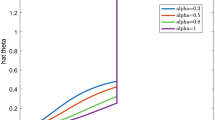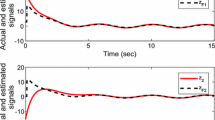Abstract
Adaptive filtering algorithms are investigated when system models are subject to model structure errors and regressor signal perturbations. System models for practical applications are often approximations of high-order or nonlinear systems, introducing model structure uncertainties. Measurement and actuation errors cause signal perturbations, which in turn lead to uncertainties in regressors of adaptive filtering algorithms. Employing ordinary differential equation (ODE) methodologies, we show that convergence properties and estimation bias can be characterized by certain differential inclusions. Conditions to ensure algorithm convergence and bounds on estimation bias are derived. These findings yield better understanding of the robustness of adaptive algorithms against structural and signal uncertainties.
Similar content being viewed by others
References
B. Fitzpatrick, G. Yin, L. Wang. Robustness, weak stability, and stability in distribution of adaptive filtering algorithms under model mismatch. Multiscale Modeling & Simulation, 2011, 9(1): 183–207.
R. Z. Has’minskii. Stochastic Stability of Differential Equations. Alphen aan den Rijn, Netherlands: Sijthoff & Noordhoff, 1980.
W. M. Wonham. Lyapunov criteria for weak stochastic stability. Journal of Differential Equations, 1966, 2(2): 195–207.
G. Yin, C. Zhu. Hybrid Switching Diffusions: Properties and Applications. Berlin: Springer-Verlag, 2010.
P. K. Orzechowski, N. Chen, S. Gibson, et al. Optimal suppression of laser beam jitter by high-order RLS adaptive control. IEEE Transactions on Control Systems Technology, 2008, 16(2): 255–267.
N. O. Pérez, N. Chen, S. Gibson, et al. Variable-order adaptive control of a microelectromechanical steering mirror for suppression of laser beam jitter. Optical Engineering, 2006, 45(10): 104206-1–104206-12.
A. Benveniste, M. Metivier, P. Priouret. Adaptive Algorithms and Stochastic Approximations. Berlin: Springer-Verlag, 1990.
H. Chen, G. Yin. Asymptotic properties of sign algorithms for adaptive filtering. IEEE Transactions on Automatic Control, 2003, 48(9): 1545–1556.
E. Eweda, O. Macchi. Quadratic mean and almost-sure convergence of unbounded stochastic approximation algorithms with correlated observations. Annales de l’Institut Henri Poincare (Section B), 1983, 19(3): 235–255.
H. J. Kushner, A. Shwartz. Weak convergence and asymptotic properties of adaptive filters with constant gains. IEEE Transactions on Information Theory, 1984, 30(2): 177–182.
H. J. Kushner, G. Yin. Stochastic Approximation and Recursive Algorithms and Applications. 2nd ed. New York: Springer-Verlag, 2003.
C. P. Kwong. Dual signal algorithm for adaptive filtering. IEEE Transactions on Communications, 1986, 34(12): 1272–1275.
L. Ljung. System Identification: Theory for the User. Englewood Cliffs: Prentice Hall, 1987.
O. Macchi, E. Eweda. Convergence analysis of self-adaptive equalizers. IEEE Transactions on Information Theory, 1984, 30(2):161–176.
L. Wang, G. Yin, J. Zhang, et al. System Identification with Quantized Observations: Theory and Applications. Boston: Birkhauser, 2010.
B. Widrow, S.D. Stearns. Adaptive Signal Processing. Englewood Cliffs: Prentice Hall, 1985.
G. Yin, V. Krishnamurthy, C. Ion. Iterate-averaging sign algorithms for adaptive filtering with applications to blind multiuser detection. IEEE Transactions on Information Theory, 2003, 49(3): 657–671.
L. V. Thanh, G. Yin, L. Wang. State observers with random sampling times and convergence analysis of double-indexed and randomly-weighted sums of mixing processes. SIAM Journal on Control and Optimization, 2011, 49(1): 106–124.
L. Wang, G. Yin. Quantized identification with dependent noise and Fisher information ratio of communication channels. IEEE Transactions on Automatic Control, 2010, 55(3): 674–690.
P. Billingsley. Convergence of Probability Measures. New York: John Wiley & Sons, 1968.
S. N. Ethier, T. G. Kurtz. Markov Processes, Characterization and Convergence. New York: John Wiley & Sons, 1986.
H. J. Kushner. Approximation and Weak Convergence Methods for Random Processes, with Applications to Stochastic Systems Theory. Cambridge, MA: The MIT Press, 1984.
W. A. Fuller. Measurement Error Models. New York: John Wiley & Sons, 1987.
H. Chen, L. Guo, A. Gao. Convergence and robustness of the Robbins-Monro algorithm truncated at randomly varying bounds. Stochastic Processes and Their Applications, 1987, 27(2): 217–231.
H. Chen. Recursive Estimation and Control for Stochastic Systems. New York: John Wiley & Sons, 1985.
G. Yin. Asymptotic properties of an adaptive beam former algorithm. IEEE Transactions on Information Theory, 1989, 35(4): 859–867.
Author information
Authors and Affiliations
Additional information
The research of B. G. Fitzpatrck was partly supported by the Joint Technology Office and the Air Force Office of Scientific Research through the Multidisciplinary Research Initiative (No. F49620-02-1-0319), and the Air Force Office of Scientific Research (No. FA9550-09-1-0524). The research of G. Yin was partly supported by the Air Force Office of Scientific Research (No. FA9550-10-1-0210), and partly by the Natural Science Foundation of China (No. 70871055). The research of L. Wang was partly by supported by the Air Force Office of Scientific Research (No. FA 9550-10-1-0210).
Ben G. FITZPATRICK received his B.S. degree in Applied Mathematics from Auburn University in 1981, M.S. degree in Probability and Statistics from Auburn in 1983, and Ph.D. in Applied Mathematics from Brown University in 1988. After serving at Mathematics Departments of University of Tennessee and North Carolina State University, he founded Tempest Technologies, a research and development consultancy, in 1998. He was appointed Clarence J. Wallen Professor of Mathematics at Loyola Marymount University in 2002.
Gang G. YIN received his B.S. degree in Mathematics from the University of Delaware in 1983, M.S. degree in Electrical Engineering, and Ph.D. in Applied Mathematics from Brown University in 1987. He joined Wayne State University in 1987 and became a professor in 1996. He severed on the IFAC Technical Committee on Modeling, Identification and Signal Processing, and many conference program committees; he was Co-chair of 1996 AMS-SIAM Summer Seminar in Applied Mathematics and 2003 AMSIMS-SIAM Summer Research Conference, Co-organizer of 2005 IMA Workshop on Wireless Communications. He is Co-chair of 2011 SIAM Control Conference, Program Director of SIAM Activity Group on Control and Systems Theory, is an associate editor of Automatica and SIAM Journal on Control and Optimization, and is on the editorial board of a number of other journals. He was an associate editor of IEEE Transactions on Automatic Control (1994–1998). He is a fellow of IEEE.
Le YiWANG received his Ph.D. degree in Electrical Engineering from McGill University, Montreal, Canada, in 1990. Since 1990, he has been with Wayne State University, Detroit, Michigan, where he is currently a professor in the Department of Electrical and Computer Engineering. His research interests are in the areas of complexity and information, system identification, robust control, Hinfinity optimization, time-varying systems, adaptive systems, hybrid and nonlinear systems, information processing and learning, as well as medical, automotive, communications, power systems, and computer applications of control methodologies. He was a keynote speaker in several international conferences. He serves on the IFAC Technical Committee on Modeling, Identification and Signal Processing. He was an associate editor of the IEEE Transactions on Automatic Control and several other journals, and currently is an editor of the Journal of System Sciences and Complexity, and an associate editor of Journal of Control Theory and Applications. He is a fellow of IEEE.
Rights and permissions
About this article
Cite this article
Fitzpatrick, B.G., Yin, G.G. & Wang, L.Y. Convergence and error bounds of adaptive filtering under model structure and regressor uncertainties. J. Control Theory Appl. 10, 144–151 (2012). https://doi.org/10.1007/s11768-012-0195-7
Received:
Revised:
Published:
Issue Date:
DOI: https://doi.org/10.1007/s11768-012-0195-7




